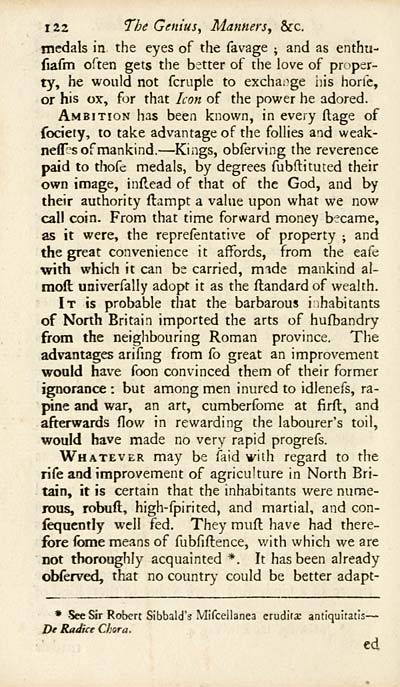Blair Collection > Critical dissertations on the origin, antiquities, language, government, manners, and religion, of the antient Caledonians, their posterity the Picts, and the British and Irish Scots
(160)
Download files
Complete book:
Individual page:
Thumbnail gallery: Grid view | List view

122 The Genius^ MannerSy &c.
medals in the eyes of the favage ; and as enthu-
fiafm often gets the better of the love of proper-
ty, he would not fcruple to exchange ins horfc,
or his oy, for that Icon of the power he adored.
Ambition has been known, in every (lage of
fodety, to take advantage of the follies and weak-
neflT^s of mankind. — Kings, obferving the reverence
paid to thofc medals, by degrees fubftituted their
own image, indead of that of the God, and by
their authority flampt a value upon what we now
call coin. From that time forward money became,
as it were, the reprefentative of property ; and
the great convenience it affords, from the eafe
with which it can be carried, m^de mankind al-
moft univerfally adopt it as the ftandard of wealth.
It is probable that the barbarous i ihabitants
of North Britain imported the arts of hufbandry
from the neighbouring Roman province. The
advantages arifmg from fo great an improvement
would have foon convinced them of their former
ignorance : but among men inured to idlenefs, ra-
pine and war, an art, cumberfome at firft, and
afterwards flow in rewarding the labourer's toil,
would have made no very rapid progrefs.
Whatever may be faid with regard to the
rife and improvement of agriculture in North Bri-
tain, it is certain that the inhabitants were nume-
rous, robuft, high-fpirited, and martial, and con-
iequcntly well fed. They raufl have had there-
fore ibme means of fubfiftence, v/ith which we are
not thoroughly acquainted *. It has been already
obferved, that no country could be better adapt-
• See Sir Robert Sibbald's Mifcelianea erudifse antiquitatis —
De RaJice Chora.
ed
medals in the eyes of the favage ; and as enthu-
fiafm often gets the better of the love of proper-
ty, he would not fcruple to exchange ins horfc,
or his oy, for that Icon of the power he adored.
Ambition has been known, in every (lage of
fodety, to take advantage of the follies and weak-
neflT^s of mankind. — Kings, obferving the reverence
paid to thofc medals, by degrees fubftituted their
own image, indead of that of the God, and by
their authority flampt a value upon what we now
call coin. From that time forward money became,
as it were, the reprefentative of property ; and
the great convenience it affords, from the eafe
with which it can be carried, m^de mankind al-
moft univerfally adopt it as the ftandard of wealth.
It is probable that the barbarous i ihabitants
of North Britain imported the arts of hufbandry
from the neighbouring Roman province. The
advantages arifmg from fo great an improvement
would have foon convinced them of their former
ignorance : but among men inured to idlenefs, ra-
pine and war, an art, cumberfome at firft, and
afterwards flow in rewarding the labourer's toil,
would have made no very rapid progrefs.
Whatever may be faid with regard to the
rife and improvement of agriculture in North Bri-
tain, it is certain that the inhabitants were nume-
rous, robuft, high-fpirited, and martial, and con-
iequcntly well fed. They raufl have had there-
fore ibme means of fubfiftence, v/ith which we are
not thoroughly acquainted *. It has been already
obferved, that no country could be better adapt-
• See Sir Robert Sibbald's Mifcelianea erudifse antiquitatis —
De RaJice Chora.
ed
Set display mode to: Large image | Transcription
Images and transcriptions on this page, including medium image downloads, may be used under the Creative Commons Attribution 4.0 International Licence unless otherwise stated. ![]()
| Permanent URL | https://digital.nls.uk/76288371 |
|---|
| Description | A selection of books from a collection of more than 500 titles, mostly on religious and literary topics. Also includes some material dealing with other Celtic languages and societies. Collection created towards the end of the 19th century by Lady Evelyn Stewart Murray. |
|---|
| Description | Selected items from five 'Special and Named Printed Collections'. Includes books in Gaelic and other Celtic languages, works about the Gaels, their languages, literature, culture and history. |
|---|

